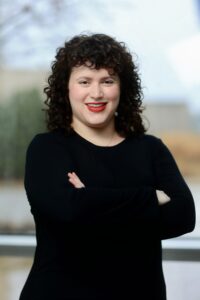Rachel Garoon ’24 sometimes feels like she speaks music better than she speaks English. In addition to playing a slew of instruments ranging from piano and violin to clarinet, she also sang in middle school and high school.
“It was a high school choir teacher who, upon hearing me sing, said, ‘I think it would be beneficial for you to look at vocal performance degrees,’ implying classical music and opera,” says Garoon. “These were worlds I knew nothing about at the time.”
She heeded her teacher’s advice and went on to study vocal performance at Lawrence University in Appleton, WI, and work in the Lawrence Conservatory.
But it didn’t take long for Garoon to realize that performing wasn’t her passion after all. Instead, she was more interested in what happened behind the stage.
“When I was involved in operas at Lawrence, I loved the idea of being the woman behind the curtain, like in The Wizard of Oz,” she explains. For Garoon, the timing was right when Lawrence University hired a director of opera studies, Copeland Woodruff, who became her mentor and taught her how to manage an opera stage.
After graduating in 2017, Garoon took her degree in vocal performance and her experience in production to the Ravinia Festival, one of the oldest outdoor music festivals in the country, where she served as a production assistant. Then it was on to the Washington National Opera in Washington, DC, where she worked as a production assistant before taking on stage manager positions at the Houston Grand Opera, San Francisco Opera, and Lyric Opera of Chicago.
Along with many others in creative industries, the arrival of the pandemic caused Garoon to pause and rethink her path. She wanted to pursue a master’s program but knew another music degree wasn’t for her. Instead, she wanted to build her business skills and understand the minutia behind what it takes to keep creative arts organizations running.
She applied to the MS in Leadership for Creative Enterprises (MSLCE) program and was accepted at the same time she received an offer to return to the San Francisco Opera to work its full season. There was very little turnover in stage management at the time, and Garoon wanted to jump at the chance, so she put her master’s degree on hold.
She served as the coordinating producer on a podcast developed by the opera house to keep community members involved in classical music during lockdown. When audiences were able to return to the opera house once again, she worked two more full seasons.
“During that time, I became acutely aware of the fact that classical music has a very specific reputation,” she describes. “I knew there had to be a way in which classical music nonprofits could function the way nonprofits are intended to function: as a service to a community. It requires a shift in mindset and in business models. I had such a small scope of knowledge, but I wanted to be in the rooms where conversations about improvement were happening.”
She knew the time was right to shift her focus once again to the MSLCE program. Watching one of her colleagues complete the program during the pandemic motivated her even more.
“I heard how people spoke about her,” says Garoon. “She became a completely different professional. They could easily see her in leadership roles, and I wanted people to be able to say that about me. I wanted to be someone who people would trust being in a leadership role.”
Entering the program with a specific career path in mind—stage management at a large opera house—she credits External Programs, Internships, and Creer Services (EPICS) Associate Director Mandi Glowen with changing her mindset and helping her dream bigger.
To make an impact in the creative industries, Garoon now has her sights set on serving as the COO, CEO or artistic director of a classical music nonprofit.
The program opened her eyes in other ways, too. While she never considered herself a “math person,” Adjunct Lecturer Cory Sandrock’s Economics of Creative Enterprises course proved her assumption wrong.
“I went into that class terrified, but it turns out I love learning about accounting and forecasting,” she says. “It opened my eyes to decisions that were made by some of my employers that I didn’t understand from my corner of stage management at the time.”
For Garoon, the program has been impactful in other ways, too—namely in terms of the network she’s built with fellow students and faculty. In fact, the program has been so influential in her life that she says she can’t imagine a world in which she didn’t earn an MS in Leadership for Creative Enterprises.
“I get to work side by side with people who are not only as passionate about the work as I am but also have become great friends. If I wouldn’t have met them, this would be a far lesser world for me.”
4 Things Rachel Garoon Enjoys About Real-World Case Studies in MSLCE
For Garoon, the final project in Clinical Assistant Professor Allison Henry’s Business Models Course involved advising the League of Chicago Theatres CEO on ways to improve its programs and services. Here’s what she enjoyed most about the experience.
- “It was an actual problem—a live case study. There was nothing theoretical about it.”
- “I loved doing research for an entity that primarily serves as a resource for the Chicago performing arts community.”
- “I learned how to implement different frameworks to assess business health, pain points, and areas for improvement.”
- “The top projects were sent to the CEO to use, and I’m really proud that my team’s project was selected.”
Read more on our blog and follow Northwestern’s MS in Leadership for Creative Enterprises program on Facebook, Instagram and Linkedin.
